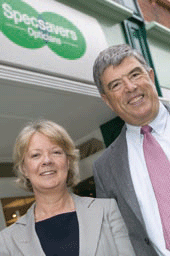Specsavers has reached the 700th practice milestone with the opening of three practices in Norway. Chris Bennett interviews its founders about the business model, competitors and its long-term strategy
There are few names in optics that polarise opinion as starkly as Specsavers. Its founders, husband and wife team Doug and Mary Perkins could not be further from the traditional image of hyper-successful business leaders. For Doug Perkins the 'numbers' hold no interest, while Mary talks of bringing affordable eye care to everyone. Yet today the couple sit at the head of a hugely successful optical business empire boasting 700 practices in five countries.
Specsavers was set up in 1984 and since then not a single practice has been closed, but its success and innovative approach has brought some controversy.
Doug Perkins takes a measured approach to those who accuse Specsavers of damaging the profession: 'I believe that Specsavers has championed value for money and has maintained its mission to offer affordability to everyone. Specsavers has uniquely championed the UK-owned value for money concept which has helped to increase sight tests for the whole market by about 50 per cent in the last 20 years.'
He points to the group's many awards and accolades: 'This success is good for UK optics and it's British. Our partners are very focused on their teams, the customer and the regulatory bodies and the hard work that at least a dozen of them put into those regulatory bodies are the important things as far as we are concerned.' He is also philosophical about the sniping about Specsavers on websites such as Monoptica's Nettalk. 'Constructive criticism we are interested in, but anything that is in the area of taking pot shots I think just flows over them [the partners].'
He is also philosophical about the sniping about Specsavers on websites such as Monoptica's Nettalk. 'Constructive criticism we are interested in, but anything that is in the area of taking pot shots I think just flows over them [the partners].'
He says the average partner has been with Specsavers for 10 years and they have seen it all before.
Perkins makes no apology for the position the business enjoys but he is clearly not obsessed with its size. When asked how many practices the group has he responds: 'Amazingly I am extremely poor at those kinds of headlines, the numbers don't drive me, it's the concept side that does.
'I am interested in opportunities and business models that are based on optometry rather than optical boutiques. They don't excite me so much.'
Register now to continue reading
Thank you for visiting Optician Online. Register now to access up to 10 news and opinion articles a month.
Register
Already have an account? Sign in here



